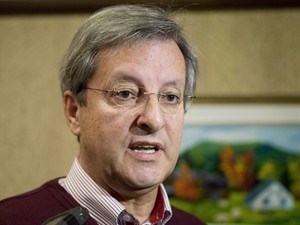
Saguenay, Que. Mayor Jean Tremblay, responds to reporters' questions in Saguenay, Que., on Saturday, September 1, 2012. In a decision that had an immediate impact in several cities and towns across the country, the Supreme Court of Canada ruled Wednesday that prayers cannot be recited before municipal council meetings in Saguenay, Que. THE CANADIAN PRESS/Jacques Boissinot
Republished April 15, 2015 - 2:19 PM
Original Publication Date April 15, 2015 - 7:20 AM
MONTREAL - In a decision that had an immediate impact in several cities and towns across the country, the Supreme Court of Canada ruled Wednesday that prayers cannot be recited before municipal council meetings in Saguenay, Que.
The reading of a Catholic prayer at council meetings infringes on freedom of conscience and religion, the court said in a unanimous ruling.
Canadian society has evolved and given rise to a ''concept of neutrality according to which the state must not interfere in religion and beliefs,'' the judgment said.
"The state must instead remain neutral in this regard."
The ruling ended an eight-year legal battle that pitted atheist Alain Simoneau and a secular-rights organization against Saguenay Mayor Jean Tremblay.
While Tremblay will address reporters on Thursday, the effect of the high court's decision was felt immediately as other Canadian cities began to act.
Ottawa Mayor Jim Watson suspended prayers at a city council meeting Wednesday pending a review of the decision, while the mayor of Levis, Que., said he'll do the same at a council meeting next week.
Several other Ontario cities, including Windsor, say they'll do away with the Lord's Prayer in the wake of the ruling, but the mayors of Winnipeg and Oshawa, Ont., told reporters they would not immediately put an end to the practice.
The Federation of Canadian Municipalities said Wednesday the issue hasn't been a significant one for members.
Its Quebec counterpart said it will be up to each municipality to decide how to comply with the decision. Some, for example, may choose to have a moment of silent reflection, said Patrick Lemieux, a spokesman for the Union of Quebec Municipalities.
Although the Supreme Court decision ruling is based on the Quebec Charter of Rights and Freedoms, the province's legislation parallels the federal Charter of Rights and Freedoms on these tenets, says law professor Errol Mendes.
That would make a legal challenge by another community an uphill climb, according to Mendes, who teaches constitutional and international law at the University of Ottawa.
"I think it's a fairly strong signal to the councils across the country that they really have to look at their practices," he said in an interview.
"Essentially, the court is basically putting forward a very strong statement, not so much on freedom of religion but freedom from religion."
In the Saguenay case, Simoneau filed an initial complaint in 2007.
City officials introduced a bylaw in 2008 that changed the prayer with a new one it deemed more neutral and delayed the opening of council by two minutes to allow citizens a window to return following the recital.
But in 2011, Quebec's human rights tribunal ordered an end to the prayers, demanded that a crucifix in the city council chamber be removed and awarded damages to Simoneau.
The Quebec Court of Appeal overturned the tribunal's decision in 2013.
The appeals court expressed some reservations about religious symbols in the council chamber, but concluded the city imposed no religious views on its citizens and ruled reciting a prayer does not violate the religious neutrality of the city. The lower court said if the recitation interfered with Simoneau's moral values, the interference was trivial.
The Supreme Court of Canada disagreed.
''This neutrality requires that the state neither favour nor hinder any particular belief, and the same holds true for non-belief," the ruling read. "It requires that the state abstain from taking any position and thus avoid adhering to a particular belief.
''When all is said and done, the state's duty to protect every person's freedom of conscience and religion means that it may not use its powers in such a way as to promote the participation of certain believers or non-believers in public life to the detriment of others.''
The Supreme Court did not deal directly with the question of religious symbols.
Tremblay, a very popular and outspoken mayor in the community 250 kilometres north of Quebec City, mounted his legal battle and raised money from supporters through the city's website. A fervent Catholic, he said it was a fight to maintain the province's Roman Catholic heritage.
But the high court added that celebrating and preserving religious heritage cannot justify the state engaging in a discriminatory practice for religious purposes.
The lawyer who represented the secular-rights group was pleased with the ruling.
"We couldn't have asked for better," said Luc Alarie.
Quebec Justice Minister Stephanie Vallee said the Liberal government will address the neutrality issue.
"We're going to analyze the judgment and see its impact on Quebec legislation and on what we intend to do," she said.
- With files from Melanie Marquis in Ottawa
Note to readers: This is a corrected story. An earlier version said the legal battle had spanned nine years and the prayer had been put on hold
News from © The Canadian Press, 2015